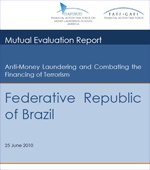The FATF publishes a executive summary of the mutual evaluation report which summarises the anti-money laundering (AML)/combating the financing of terrorism (CFT) measures in place in the Federative Republic of Brazil (hereinafter Brazil) as of the time of the on-site visit (26 October to 7 November 2009), and shortly thereafter.
Key Findings
Brazil, which is a member of both the FATF and the Grupo de Acción Financiera de Sudamérica (GAFISUD), has developed a coherent AML/CFT strategy, the National Strategy Against Corruption and Money Laundering (ENCCLA), which has enabled it to make systematic progress to enhance its implementation of AML/CFT measures. An important outcome of this strategy is a Bill to amend Federal Law 9613/1998 (the AML Law) and criminalise terrorist financing. This Bill has been approved by the Senate and is currently under consideration in the House of Representatives.
Brazil has significantly enhanced its ability to prosecute money laundering (ML) offences by implementing a system of Specialised Federal Courts which bring together federal prosecutors and judges specialised and with experience in handling cases involving ML and other financial crimes. The main sources of proceeds of crime in Brazil are corruption and crimes against the national financial system, including fraud and capital flight. Drug trafficking, weapons trafficking, organised crime, smuggling and embezzlement of governmental money are also important sources of illegal proceeds.
The ML risks are higher in relation to the border areas and the informal economy. The banking sector is perceived to face greater ML risk in the business areas of foreign exchange and private banking. ML risk has been detected in the securities sector through the use of a broker to deposit funds and conduct stock market transactions. In the insurance sector, accumulation, life and pension/retirement products are perceived as being the most vulnerable to ML. Some cases of illicit drugs being exchanged for precious stones have been detected, although this is uncommon, as profit margins for precious stones sold on the open market are relatively low because most of the precious stone trade conducted in Brazil is carried out on the wholesale export market and the retail market is residual.. No ML cases have been detected in the closed pension funds sector.
The government of Brazil has been working to mitigate the risk of terrorist financing (FT) in its territory. Such work has been carried out in close co-operation with other interested governments and allows to keep under strict surveillance all activities considered to be of higher risk. Initiatives such as regional intelligence structures, joint operations and exchange of information, among others, are used to identify, prevent and disrupt activities that could be related to terrorism and its financing.
The ML offence is largely in line with international requirements; however, overall the number of final sentences and convictions is low, given the size of the country and the sophistication of its financial system. Brazil has not criminalised terrorist financing as a stand alone offence in a manner that is consistent with the international requirements. Since 2004, Brazil has pursued a strategy of enhancing its systems for applying provisional measures and confiscation. Overall, the statistics show a sufficient number of seizures, but a relatively low number of confiscations.
Brazil has effective mechanisms to facilitate policy and operational co-operation at the domestic level, particularly through the ENCCLA mechanism. Systems for providing mutual legal assistance are not impacted by deficiencies in the criminalisation of terrorist financing because Brazil can provide MLA in the absence of dual criminality and has demonstrated its ability to do so in practice. Money laundering is an extraditable offence. However, deficiencies in the criminalisation of FT impede Brazil’s ability to extradite (or prosecute its own nationals) in such cases, as dual criminality is required.
Preventative measures apply to all financial institutions, dealers in precious metals and stones, and real estate agents who are legal persons. However, the extent to which such measures are elaborated is much less robust outside of the banking (including money remittance and foreign exchange), securities and insurance sectors. All financial institutions are subject to comprehensive requirements to identify politically exposed persons (PEPs), keep records and report suspicious transactions. Banking, securities and insurance institutions are required to identify beneficial owners. Breaches of the AML/CFT requirements are punishable by a full range of sanctions.
Key recommendations made to Brazil include: criminalise FT in a manner consistent with the international requirements; continue to support the Specialised Federal Courts and other measures to enhance the ability to apply final sanctions for ML; extend corporate civil or administrative liability to legal persons who commit ML/FT; ensure that confiscation is systematically pursued; implement effective laws and procedures to take freezing action pursuant to the relevant United Nations Security Council Resolutions (UNSCRs); broaden the obligation to declare physical cross-border transportations of currency and bearer negotiable instruments (BNI); enhance supervisory powers and resources in some areas; increase supervision of non-bank financial institutions; and extend AML/CFT requirements to all categories of designated non-financial businesses and professions (DNFBP).
This mutual evaluation was conducted using the FATF Recommendations as published in October 2004, and the 2004 Methodology for Assessing Compliance with the FATF 40 Recommendations and FATF 9 Special Recommendations.


 Twitter
Twitter
 Facebook
Facebook
 Instagram
Instagram
 Linkedin
Linkedin
